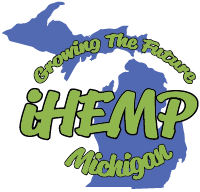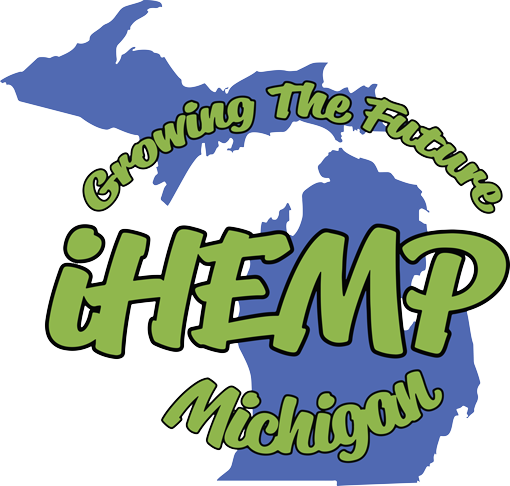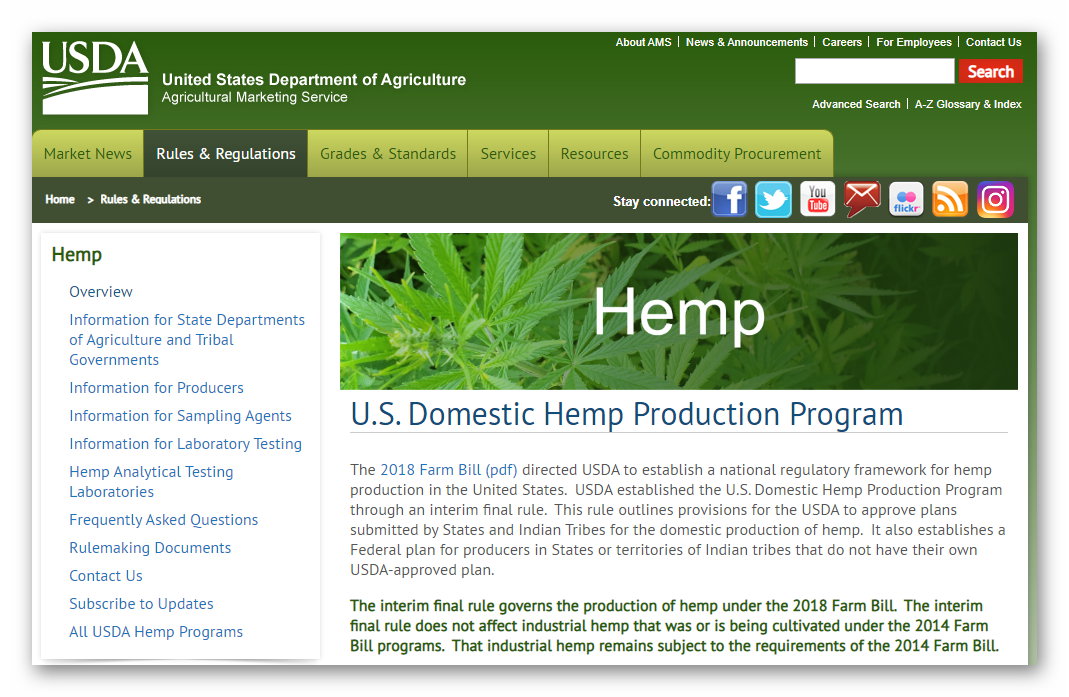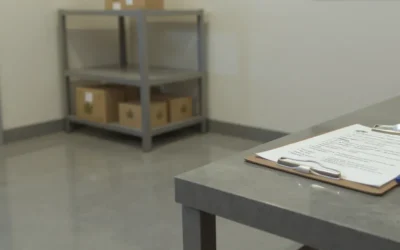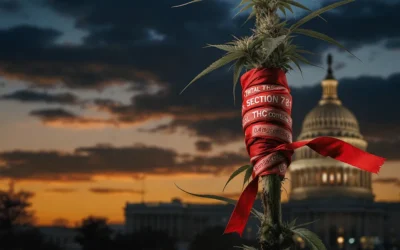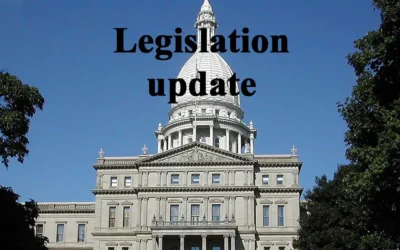https://www.ams.usda.gov/rules-regulations/hemp/enforcement
Enforcement Discretion – Interim Final Rule
The contents of this web page do not have the force and effect of law and are not meant to bind the public in any way. The following is intended only to provide clarity to the public regarding existing requirements under the law or agency policies.
Section 10113 of the Agriculture Improvement Act of 2018 (2018 Farm Bill) legalized the commercial production of hemp nationwide after several decades of its being controlled under the Controlled Substances Act. Because this legalization is a recent development, there is currently insufficient capacity in the United States for testing of hemp and disposing of non-compliant plants. To allow the Federal government sufficient time to work with industry to address this issue, the U.S. Department of Agriculture (USDA) is delaying enforcement of certain requirements in the Interim Final Rule (IFR) on the Domestic Hemp Production Program (84 FR 58522) under certain circumstances until October 31, 2021, or publication of the final rule, whichever occurs first.
We are delaying enforcement of these requirements based on comment received in response to the IFR and in discussions with states and tribes as they pursue USDA-approval of their plans. Through these conversations, we have learned that these provisions will serve as a significant hindrance to the growth of a domestic hemp market at this nascent stage. For instance, we now better understand how the limited number of DEA-registered labs will hinder testing and better understand the associated costs with disposing of product that contains over 0.3% THC could make entering the hemp market too risky. Because USDA is exercising its enforcement discretion to adopt a temporary policy of non-enforcement for producers who—due to the dearth of registered laboratories and limited access to reverse distributors or law enforcement disposal—are unable to comply with the testing and disposal procedures promulgated through the IFR, we believe that this guidance is a statement of agency policy not subject to the notice and comment requirements of the Administrative Procedure Act (APA). See 5 U.S.C. § 553(b)(A).
Furthermore, as explained in the IFR, potential market entrants and related industries are relying on USDA to provide guidance in their preparations for the 2020 growing season, and the Administrator found that there was good cause to issue the IFR without prior opportunity for notice and comment and to make it immediately effective. See Establishment of a Domestic Hemp Production Program, 84 Fed. Reg. 58522, 58,553–54 (Oct. 31, 2019). For the same reasons, the Administrator finds that, even if this guidance were subject to the public participation provisions of the APA, there is good cause to proceed without notice and comment and to make the guidance immediately effective.
We also note that, while we consider these steps necessary at the moment, these policies may no longer be appropriate as we draft the final rule and will serve as a temporary measure to allow a smooth transition into regular enforcement.
Delay in Requirement For DEA Laboratory Registration
The 2018 Farm Bill allows the production of hemp in the United States and no longer includes hemp as a controlled substance. Hemp with a tetrahydrocannabinol (THC) level of 0.3% or less on a dry weight basis is not a controlled substance in the United States. We also know that weather and other factors may affect the THC level in hemp and that labs may receive material that is over the 0.3% THC level and is, by definition, a controlled substance. The interim final rule (IFR) requires that laboratory testing of hemp for the purpose of determining compliance under the U.S. Domestic Hemp Product Program be conducted by laboratories appropriately registered with the Drug Enforcement Administration (DEA).
USDA is delaying enforcement of the requirement to use laboratories registered with the Drug Enforcement Administration (DEA) for testing (7 C.F.R §§ 990.3(a)(3)(i) and 990.26(e)). Under this guidance, the testing can be conducted by labs that are not yet DEA registered until the final rule is published, or Oct. 31, 2021, whichever comes first. This change will allow additional time to increase DEA registered analytical lab capacity.
All laboratories engaged in the testing of hemp through this interim period will be subject to the same compliance requirements of the IFR. Specifically, labs must adhere to the standards of performance as outlined within the IFR, including the requirement to test for total THC employing post-decarboxylation or other similarly reliable methods. All labs will have to make arrangements to be compliant with registration requirements before this period of delayed enforcement expires. DEA will evaluate all applications using the criteria required by the Controlled Substances Act (21 U.S.C. § 823(f)).
Disposal of Non-compliant Plants
USDA is delaying enforcement of the requirement that producers use a DEA-registered reverse distributor or law enforcement to dispose of non-compliant plants (7 C.F.R. §§ 990.3(a)(3)(iii)(E) and 990.27) if the producer disposes of the plants using one or more of the means described in the link provided below. It is the agency’s intent that these methods allow producers to apply common on-farm practices as a means of disposal while rendering the controlled substance non-retrievable or non-ingestible. Producers must document the disposal of all non-compliant plants in accordance with § 990.27. Reporting can be accomplished by providing USDA with a completed: “USDA Hemp Plan Producer Disposal Form.”
Cannabis with a THC level of over 0.3% on a dry weight basis is a controlled substance, that must be disposed of onsite according to the disposal methods approved by USDA. The state, tribe or the state’s department of agriculture wishing to have primary regulatory responsibility have the responsibility for establishing protocols and procedures to ensure non-compliant plants are appropriately disposed of in compliance with applicable state, tribal, and federal law. States and Indian Tribes operating under approved hemp production plans must notify USDA of any occurrence of non-conforming plants or plant material and provide the disposal record of those plants and materials monthly. There is a similar requirement for producers operating under the USDA plan. Additionally, USDA will conduct random audits of licensees to verify hemp is being produced in accordance with the provisions of the rule.
View the options for rendering a crop non retrievable/non-ingestible
